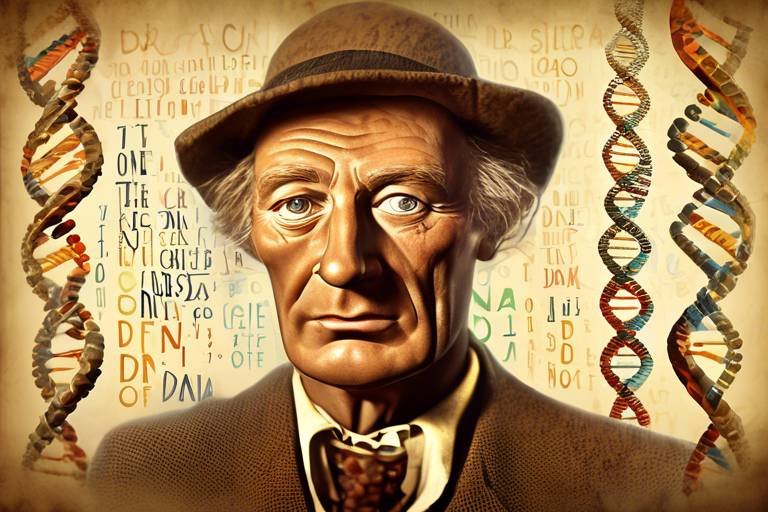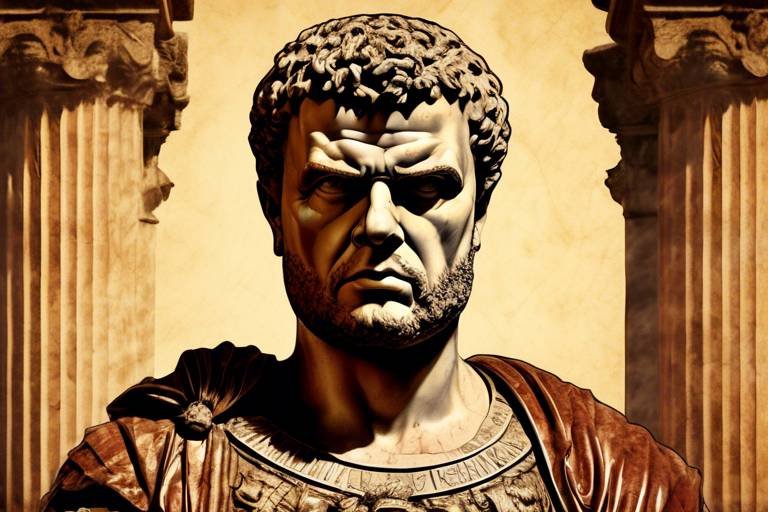Aristotle: The Philosopher of Science
Aristotle, often regarded as the Philosopher of Science, stands as a towering figure in the history of philosophy and scientific thought. His profound insights and pioneering work have left an indelible mark on the development of science and continue to influence scholars and scientists to this day.
Delving into Aristotle's early life and education unveils the formative years that shaped his intellectual journey. From his time at Plato's Academy to the establishment of his own school, the Lyceum, Aristotle's thirst for knowledge and philosophical inquiry set the stage for his groundbreaking contributions to science.
Analyzing Aristotle's works on natural sciences reveals a rich tapestry of knowledge encompassing biology, physics, and metaphysics. His meticulous observations and systematic approach laid the foundation for a deeper understanding of the natural world, setting a precedent for future scientific inquiry.
Examining Aristotle's concept of causality sheds light on his theory of the four causes, a framework that revolutionized scientific explanation. By identifying the material, formal, efficient, and final causes of phenomena, Aristotle provided a comprehensive model for understanding the workings of the universe.
Exploring Aristotle's empirical approach to studying the natural world unveils a methodology rooted in careful observations and systematic experiments. His dedication to evidence-based inquiry set a standard for scientific investigation that continues to resonate in modern scientific practices.
Tracing Aristotle's influence on medieval science uncovers the profound impact of his ideas on scholars of the time. The integration of Aristotle's scientific principles into Christian theology and philosophy heralded a new era of intellectual exploration and paved the way for advancements in various fields of study.
Investigating Aristotle's legacy in modern science highlights the enduring relevance of his methodologies and principles. His emphasis on logical reasoning, empirical observation, and systematic inquiry continues to inform contemporary scientific practices and theories, bridging the gap between ancient wisdom and modern knowledge.
Comparing Aristotle's philosophy of science with modern scientific methodologies reveals both similarities and differences in approach. While Aristotle's emphasis on teleology and qualitative analysis contrasts with the quantitative and experimental focus of modern science, his foundational contributions remain integral to the evolution of scientific thought.
Reflecting on Aristotle's continued relevance in the 21st century underscores the enduring impact of his philosophical ideas and scientific insights. As scientists grapple with complex questions and seek to unravel the mysteries of the universe, Aristotle's legacy serves as a guiding light, inspiring a new generation of thinkers to explore the frontiers of knowledge.

Aristotle's Early Life and Education
Aristotle, often hailed as the Philosopher of Science, had a remarkable journey that began with his early life and education. Born in 384 BC in Stagira, a small town in northern Greece, Aristotle's intellectual curiosity was evident from a young age. His father, Nicomachus, served as the personal physician to the King of Macedon, exposing Aristotle to the world of medicine and science early on.
At the age of 17, Aristotle journeyed to Athens to study at Plato's Academy, a renowned center of learning in ancient Greece. Under the tutelage of Plato, Aristotle delved into various branches of philosophy, laying the groundwork for his future contributions to scientific thought. Despite their philosophical differences, Aristotle's time at the Academy was instrumental in shaping his intellectual development.
After spending nearly 20 years at the Academy, Aristotle ventured out on his own path, establishing his own school, the Lyceum, in Athens. Here, he continued his philosophical inquiries and began to delve deeper into the natural sciences, setting the stage for his groundbreaking work in biology, physics, and metaphysics.

Aristotle's Works on Natural Sciences
Aristotle, often referred to as the "Philosopher of Science," made significant contributions to the development of scientific thought that have had a lasting impact on the philosophy of science throughout history. His works on natural sciences, including biology, physics, and metaphysics, revolutionized the understanding of the natural world and laid the groundwork for scientific inquiry.
One of Aristotle's key concepts in his works on natural sciences is his theory of the four causes, which explores the idea that everything has a cause or explanation. This concept, rooted in his philosophy, provided a framework for understanding the underlying principles governing the natural world and became a cornerstone of scientific explanation.
In addition to his theoretical contributions, Aristotle was known for his empirical approach to studying the natural world. He emphasized the importance of careful observations and systematic experiments to gather knowledge and draw conclusions about the workings of nature. This approach set a precedent for the scientific method that continues to influence scientific practices today.
Through his works on natural sciences, Aristotle not only advanced the understanding of the physical world but also delved into metaphysical aspects, exploring the fundamental principles that govern existence. His holistic approach to studying nature and the universe as a whole contributed to a comprehensive understanding of the interconnectedness of all things.
Aristotle's influence on the fields of biology, physics, and metaphysics reverberated throughout history, shaping the way scholars and scientists approached the study of the natural world. His works served as a foundation for further scientific exploration and inquiry, inspiring generations of thinkers to continue pushing the boundaries of knowledge.

Aristotle's Concept of Causality
Aristotle's concept of causality, as outlined in his philosophical works, is a fundamental aspect of his overall theory of knowledge and understanding of the natural world. According to Aristotle, every event or phenomenon has a cause, and he identified four distinct types of causes that explain why things happen the way they do.
The four causes proposed by Aristotle are the material cause, which refers to the material or substance from which something is made; the formal cause, which pertains to the design or structure of an object; the efficient cause, which involves the agent or force that brings about the change; and the final cause, which denotes the purpose or goal for which something exists.
By categorizing causality in this manner, Aristotle aimed to provide a comprehensive framework for understanding the workings of the natural world and the reasons behind phenomena. His concept of causality laid the groundwork for scientific inquiry by emphasizing the importance of identifying and analyzing the various causes that contribute to an event or outcome.
Through his exploration of causality, Aristotle sought to uncover the underlying principles that govern the universe and guide the interactions of all things. This holistic approach to causation influenced not only his own scientific investigations but also the development of scientific thought in subsequent centuries.

Aristotle's Observations and Experiments
Aristotle's approach to studying the natural world was characterized by his meticulous observations and systematic experiments, setting the stage for modern scientific inquiry. Rather than relying solely on abstract reasoning, Aristotle believed in the importance of empirical evidence to support his theories and conclusions.
Through his keen observations of plants, animals, and natural phenomena, Aristotle laid the groundwork for the scientific method by emphasizing the need for careful data collection and analysis. He understood the value of direct experience in uncovering the underlying principles governing the natural world.
One of Aristotle's notable experiments involved the dissection of animals to study their anatomical structures and physiological functions. By conducting these hands-on investigations, Aristotle was able to draw connections between the form and function of living organisms, paving the way for advancements in biological science.
Furthermore, Aristotle's emphasis on systematic observation led him to develop detailed classifications of plants and animals based on their shared characteristics. His work in taxonomy and natural history provided a framework for organizing the diversity of life forms and understanding their relationships within the broader ecosystem.
In essence, Aristotle's commitment to empirical observation and experimentation revolutionized the way scholars approached the study of nature, laying the foundation for the empirical traditions that continue to shape scientific inquiry today.

Aristotle's Influence on Medieval Science
During the medieval period, Aristotle's influence on science was profound and far-reaching, shaping the intellectual landscape of the time. Medieval scholars, particularly those in the Christian world, revered Aristotle as the pinnacle of scientific knowledge and sought to reconcile his teachings with Christian theology.
Aristotle's works, translated into Latin by scholars such as Thomas Aquinas, became essential reading in medieval universities and monasteries. His ideas on natural philosophy, metaphysics, and ethics formed the basis of medieval scholasticism, a philosophical and theological system that dominated intellectual discourse in the Middle Ages.
One of the key aspects of Aristotle's influence on medieval science was his emphasis on the importance of observation and reason in understanding the natural world. Medieval scholars, inspired by Aristotle, sought to harmonize reason with faith, believing that the study of nature could lead to a deeper understanding of God's creation.
Moreover, Aristotle's concept of the four causes, which explained the reasons behind the existence and behavior of objects, influenced medieval thinkers in their approach to scientific inquiry. The idea that every natural phenomenon had a cause and that these causes could be understood through observation and reason resonated deeply with medieval scientists.
Furthermore, Aristotle's classification of the natural world into distinct categories, such as plants, animals, and minerals, provided a framework for organizing and studying the diversity of life on Earth. Medieval naturalists and philosophers relied on Aristotle's taxonomy to categorize and understand the natural world around them.
In essence, Aristotle's influence on medieval science was transformative, laying the groundwork for the development of scientific thought in the Middle Ages and shaping the intellectual traditions that would pave the way for the scientific revolution in later centuries.
Frequently Asked Questions:
- Is Aristotle considered the father of modern science?
- What was Aristotle's view on the relationship between science and philosophy?
- How did Aristotle's ideas influence the scientific method?
- What role did Aristotle play in the development of medieval scholasticism?
- Why is Aristotle's concept of the four causes significant in the history of science?

Aristotle's Legacy in Modern Science
Aristotle's legacy in modern science is profound and far-reaching, shaping the very essence of scientific inquiry and exploration. His meticulous approach to studying the natural world through empirical observations and systematic experiments laid the foundation for the scientific methodologies we employ today. Aristotle's emphasis on the importance of causality, as seen in his theory of the four causes, continues to influence how we understand the relationships between phenomena and their underlying principles.
One of the key aspects of Aristotle's legacy in modern science is his emphasis on the unity of knowledge and the interconnectedness of different scientific disciplines. By exploring the relationships between biology, physics, and metaphysics, Aristotle demonstrated the importance of a holistic approach to understanding the natural world. This interdisciplinary perspective has greatly influenced modern scientific practices, encouraging researchers to consider the broader implications of their work.
Furthermore, Aristotle's impact on medieval science cannot be understated. His works were instrumental in shaping the intellectual landscape of the Middle Ages, with scholars like Thomas Aquinas integrating Aristotle's ideas into Christian theology and philosophy. This fusion of scientific inquiry and religious thought laid the groundwork for the development of Western scientific traditions.
In the contemporary scientific landscape, Aristotle's legacy endures through his enduring relevance in philosophical debates and scientific discussions. While modern science has evolved significantly since Aristotle's time, his emphasis on systematic observation, logical reasoning, and empirical evidence remains central to the scientific method. Scientists and philosophers alike continue to draw inspiration from Aristotle's works, recognizing the timeless wisdom embedded in his writings.
Overall, Aristotle's legacy in modern science serves as a testament to the enduring power of his ideas and the profound impact he has had on the development of scientific thought. By exploring Aristotle's contributions to the philosophy of science, we gain valuable insights into the evolution of scientific inquiry and the ongoing quest for knowledge and understanding.

Aristotle's Philosophy of Science vs. Modern Science
Aristotle's philosophy of science, rooted in his emphasis on teleology and the concept of the four causes, differs significantly from the methodologies of modern science. Aristotle believed that everything in nature has a purpose or final cause, guiding its existence and development. This teleological approach contrasts with the mechanistic view of the universe adopted by modern science, which seeks to explain natural phenomena through observable mechanisms and laws.
Moreover, Aristotle's reliance on qualitative descriptions and deductive reasoning in his scientific inquiries contrasts with the quantitative measurements and empirical observations that characterize modern scientific methods. While Aristotle's emphasis on logic and rationality laid the foundation for scientific inquiry, modern science places a greater emphasis on experimentation, data collection, and mathematical models to test hypotheses and theories.
In Aristotle's time, scientific knowledge was intertwined with philosophical speculation and theological beliefs, leading to a holistic understanding of the natural world. However, modern science has evolved into a specialized and interdisciplinary field, with distinct branches such as physics, chemistry, biology, and astronomy, each governed by its own set of principles and methodologies.
Despite these differences, Aristotle's philosophy of science continues to influence contemporary scientific thought in profound ways. His emphasis on systematic observation, logical reasoning, and the search for underlying principles resonates with the core principles of the scientific method. While modern science has advanced technologically and methodologically, Aristotle's enduring legacy reminds us of the importance of critical thinking, empirical evidence, and the pursuit of knowledge for its own sake.

Aristotle's Relevance in the 21st Century
In the 21st century, Aristotle's relevance in the realm of science and philosophy remains palpable, transcending centuries with his profound insights and enduring legacy. Despite the vast advancements in scientific knowledge and technological innovation, Aristotle's principles continue to resonate with contemporary thinkers and scientists, offering valuable perspectives on the nature of the universe and the methods of scientific inquiry.
One of the key aspects of Aristotle's relevance in the modern era lies in his emphasis on empirical observation and systematic reasoning as foundational elements of scientific exploration. In an age dominated by data-driven research and technological tools, Aristotle's emphasis on the importance of careful observation and logical analysis serves as a timeless reminder of the essence of scientific inquiry.
Furthermore, Aristotle's holistic approach to understanding the natural world, which integrated various disciplines such as biology, physics, and metaphysics, continues to inspire interdisciplinary research and collaboration in contemporary science. In a time when the boundaries between scientific fields are becoming increasingly blurred, Aristotle's holistic perspective offers a valuable framework for addressing complex scientific questions that transcend traditional disciplinary boundaries.
In addition, Aristotle's emphasis on causality and the interconnectedness of phenomena aligns with modern scientific paradigms that seek to uncover the underlying principles governing the universe. By delving into the root causes and relationships between different phenomena, Aristotle's philosophical insights provide a solid foundation for contemporary scientific investigations into the fundamental laws of nature.
Moreover, Aristotle's enduring influence on ethical and moral philosophy continues to shape discussions on the ethical implications of scientific research and technological advancements in the 21st century. As debates on bioethics, environmental ethics, and artificial intelligence ethics proliferate, Aristotle's ethical framework offers valuable guidance on navigating the complex ethical dilemmas posed by modern scientific and technological progress.
In conclusion, Aristotle's relevance in the 21st century transcends mere historical significance, continuing to inspire and guide scientists, philosophers, and thinkers in their quest for knowledge and understanding of the natural world. As we grapple with the complexities of modern science and technology, Aristotle's timeless insights serve as a beacon of wisdom, illuminating the path towards a deeper appreciation of the mysteries of the universe.
Frequently Asked Questions
- What were Aristotle's major contributions to the development of scientific thought?
Aristotle made significant contributions to various fields of science, including biology, physics, and metaphysics. His concept of causality and the theory of the four causes laid the groundwork for scientific inquiry and explanation.
- How did Aristotle's observations and experiments influence his scientific work?
Aristotle's empirical approach to studying the natural world through careful observations and systematic experiments greatly influenced his scientific theories and methodologies, emphasizing the importance of empirical evidence in scientific inquiry.
- What is Aristotle's enduring legacy in modern science?
Aristotle's scientific methodologies and principles continue to impact contemporary scientific practices and theories. His ideas have influenced various scientific disciplines and have shaped the way we approach scientific inquiry today.



















